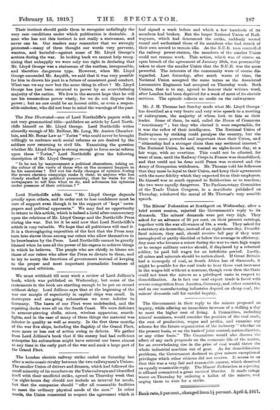Mr. J. H. Thomas last Sunday made what Mr. Lloyd
George has described as a very brave and very wise speech to a meeting of railwaymen, the majority of whom look to him as their leader. Some of them, he said, called the House of Commons " reactionary " ; but they who elected it were responsible, for it was the reflex of their intelligence. The National Union of Railwaymen by striking could paralyse the country, but the- State was more powerful and important than their Union, and " citizenship had a stronger claim than any sectional interest." The National Union, he said, wanted an eight-hours day, at a fair wage, with no overtime. This could not be effected, for wart of men, until the Railway Corps in France was demobilized, and that could not be done until Pesos was restored and the Army of Occupation withdrawn. Mr. Thomas told his followers that they must be loyal to their Union, and keep their agreements with the same fidelity which they expected from their employers. He himself was as much opposed to Bolshevism as to reaction; the two were equally dangerous. The Parliamentary Committee of the Trade Union Congress, in a manifesto published on Thursday, reinforced the moral of Mr. Thomas's very sensible speech.


































 Previous page
Previous page